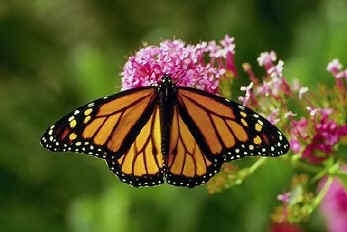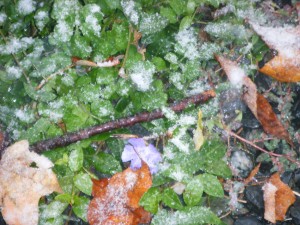
Does a Cold Winter Really Kill Off Insects?
As winter continues, if you are counting on Mother Nature to alleviate your lawn or garden of pests, think again. Whether you live in Dallas or Detroit, insects can and do survive the cold of winter. Insects’ winter survival skills can be broadly grouped into three categories: they either run, or they hide, or they “fight.”
 Runners
Runners
One way to avoid cold weather is simply to migrate to a warmer climate (such as Mexico) and return after winter. Monarch butterflies are famous for this, but other butterflies, moths and dragonflies do it as well.
Hiders
Some insects bury themselves in the soil or in leaf litter, while others may seek out cavities in trees, burrow beneath tree bark or under rocks or find warmth inside your garage, walls, or attic. Mosquitoes love to hide in places like moist leaf debris and thrive in environments ranging from the equator to the Arctic so a little deep freeze is unlikely to do them lasting damage. A freeze will kill some of the population, but it’s not going to wipe all the mosquitoes out so when temperatures rise a little and it rains, they’ll be back.
Spider mites also bury themselves in leaf debris or ground litter and can do damage in the winter and are ready to do even more damage in the spring,
 Ants and termites head deeper into the ground to just below the frost line, where their large numbers and stored food keep them comfortable until spring arrives. Cockroaches (along with fleas, silverfish and spiders) will invade homes or compost piles. Wasps, ladybugs, and stink bugs are all considered invasive pests in the fall and early winter because of their over-winter survival behavior.
Ants and termites head deeper into the ground to just below the frost line, where their large numbers and stored food keep them comfortable until spring arrives. Cockroaches (along with fleas, silverfish and spiders) will invade homes or compost piles. Wasps, ladybugs, and stink bugs are all considered invasive pests in the fall and early winter because of their over-winter survival behavior.
Most bees and wasps hibernate during the colder months. In many species, only the queen survives the winter, emerging in spring to reestablish a colony. But honey bees remain active all winter long, despite the freezing temperatures and lack of flowers on which to forage.
Insects that overwinter in the soil have a tendency to be less affected by winter weather conditions than those that don’t. Furthermore, insects that overwinter as eggs tend to withstand adverse conditions better than those which overwinter as adults, pupae or in the immature stage.
Fighters
 Since insect blood does not freeze at 32 degrees Fahrenheit, pretty much all insects can fight frost to some degree. Death by freezing isn’t related to low temperature itself as much as it is the result of ice crystals forming in the body. Rapid formation and expansion of ice crystals cause cells to burst, resulting in organ and gut damage.
Since insect blood does not freeze at 32 degrees Fahrenheit, pretty much all insects can fight frost to some degree. Death by freezing isn’t related to low temperature itself as much as it is the result of ice crystals forming in the body. Rapid formation and expansion of ice crystals cause cells to burst, resulting in organ and gut damage.
Some invertebrates can survive being frozen solid (called “freeze tolerance”) by producing ice nucleating proteins that control the freezing process within their bodies. Although the ice crystals form inside the body of the invertebrate they do not damage the cells and organs of the animal. When the weather gets warmer the crystals melt and the invertebrate becomes active again.
There is no doubt that winter is a difficult time for invertebrate. But insects and spiders have evolved lots of strategies to survive cold weather (and let’s face it, north Texas isn’t prone to a lot of freezing temperatures). Even in places such as Canada and Central Europe where night time temperatures can fall to as low as -40 degrees Centigrade, insects survive. So start cleaning up debris (remove infected foliage and rake beds clean) and spraying since “garden sanitation” is really the key to mitigating insects and diseases.
Visit Bonick Landscaping to learn more about lawn maintenance in Dallas, Texas.